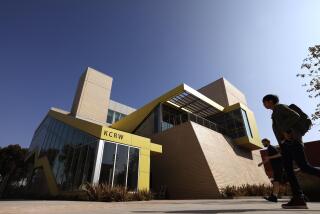Commercial-Free Religious Broadcasts--a Fading Signal : Media: While there were about 30 programs airing regularly in the L.A. area, that number has now dwindled to two.
At its zenith in the late 1960s, commercial-free religious programming was aired regularly on about 30 radio and television stations in the Los Angeles region. Now, it has dwindled to only two.
Even so, Los Angeles, with the second-largest radio and TV market in the nation, is better off than most metropolitan areas. Public-service religious programs have all but evaporated since the Federal Communications Commission deregulated the industry in 1979. The last religious program offered on any of the three major television networks free, CBS-TV’s “For Our Times,” shut down at the end of 1988.
In Los Angeles, the remaining public-service shows are KABC Radio’s “Religion on the Line” from 10 p.m. to midnight Sundays, and KCBS-TV’s “Today’s Religion” at 6:30 on Sunday mornings. “Checkpoint,” which aired at 6 a.m. Sundays on KNBC-TV, folded last year.
The only other free-time religious program produced locally is the annual Easter Sunrise service in the Hollywood Bowl. This year’s service will be broadcast live on KCAL-TV (9) from 5:15 to 7 a.m. Sunday and also carried by the Armed Forces Radio and Television Services and by some satellite feeds, according to producer-director Norma Foster.
Nationally, only a handful of commercial stations still provide gratis air time, not only because the FCC no longer requires it but especially because station owners and networks can rake in fat fees from televangelists and radio preachers who jockey for the best Sunday time slots.
Also, in recent years the burgeoning number of radio and TV stations exclusively devoted to Christian programming--most are conservative and evangelical in tone--have provided another, less expensive, outlet for many preachers and religious groups.
Leaders of commercial-free religious programs that still are on regular channels say the listening and viewing audience suffers because of the change.
“We could have a much more rounded view of religion if we . . . had more public-service religious programs,” said Mattie Hilburn, the adviser for Protestant participation on “Today’s Religion” and “Religion on the Line.”
Dennis Prager, host of “Religion on the Line”, asks: “Why don’t other broadcasters understand the thirst that Americans have for religious intellectual substance in broadcasting?”
According to the Arbitron ratings, Prager’s lively radio talk show--uninterrupted by commercials--is No. 1 among 100 area stations broadcasting in that time period. An estimated 100,000 listeners--15% of all people with their radios on at the time--tune in Prager.
An author-lecturer and former director of the Brandeis-Bardin Institute in Simi Valley, Prager thinks one reason why similar programs are so scarce today is that “most people in the media are secular and have a secular bias insofar as they believe intelligence and rationality are incompatible with religiosity. When they think of religious programming, they think of simpletons.”
Calling himself “a consistently sinning religious Jew,” Prager says that if his nonsectarian program has a bias, it’s that “religion should prevail over secularism.”
The show has continued without advertising because “no other (advertisers) have demanded to be on the air at that time,” KABC research director Jamie Maskell said. She added that the station has no immediate plans to seek commercial sponsors for the program.
Truman Jacques, the genial host and associate producer of “Today’s Religion”--it has aired on Channel 2 for more than 22 years--said his program is no less community affairs-oriented just because it is religious.
“Religion has some answers, and people who work with me are proud they are able to raise these issues within the religious community,” Jacques said.
The show, which won the Angel, a religious arts award, for a 1989 program on how people can gain, mentally and emotionally, through physical tragedy, “is part of our overall community affairs commitment,” said KCBS-TV program director Jay Strong. “It’s important that such programs continue.”
Jacques has transformed the show’s format. It used to consist of “three clergypeople who brought in a newspaper clipping and took eight minutes each to talk about it,” Jacques said. Now, it’s a sophisticated call-in show that deals with “the real world.”
“We try to pick a topic that all the religious faiths can talk about,” said the show’s associate producer, Lorena Tong.
To assure balance and expertise, “Today’s Religion” has a panel of four advisers who meet monthly with Jacques and Tong to bat around possible topics and choose appropriate guests.
Guiding the process are Father Gregory Coiro, a Capuchin priest and media representative of the Roman Catholic Archdiocese of Los Angeles, who selects a local priest from a field of 13 “regulars”; Rabbi Paul Dubin, executive vice president of the Southern California Board of Rabbis, who provides rabbis from the board membership; Nicholas Royce, who chooses representatives of the Eastern Orthodox community, and Hilburn, coordinator of radio and TV for the Religion in Media organization, who picks Protestants.
“I try to get people who won’t embarrass themselves as well as me,” Hilburn said. She noted that she especially looks for articulate minority and women representatives and avoids fundamentalists with axes to grind.
Recent tapings for the half-hour program have included “Political Ethics and Religion,” dealing with “whether there is something inherent in today’s style of office-holding that causes elected officials to stray from their ethical training or upbringing.” Sunday’s program will examine “Passover/Easter--Today’s Meaning.”
Prager’s “Religion on the Line” radio show is much more spontaneous than “Today’s Religion.” Though the same four advisers assist him, Prager says his topics are often “whatever hits me” at the last minute. In addition to having a priest, a rabbi and a member of the Protestant clergy on the show, he often invites a fourth guest. This person may be a Muslim, Mormon, Quaker, Buddhist, Hindu or Eastern Orthodox--among others, Prager said.
“I don’t take the obvious issues,” he explained. “I’m proud to say that in eight years I’ve never devoted a program to abortion. Last week, we discussed, ‘Shouldn’t people challenge the religion they were raised in?”’
Carole Hemingway, who preceded Prager as host of “Religion on the Line” from 1974 until 1982, now has a provocative religion talk show on radio station KGIL. The religion segment, aired from 4 to 6 p.m. on Tuesdays, is part of her commercially sponsored “Carole Hemingway Program,” broadcast from 2 p.m. to 6 p.m. Mondays through Fridays.
The popular religion segment includes at least two guests each week and seeks to expand on current events from a moral and religious perspective.
More to Read
The biggest entertainment stories
Get our big stories about Hollywood, film, television, music, arts, culture and more right in your inbox as soon as they publish.
You may occasionally receive promotional content from the Los Angeles Times.










